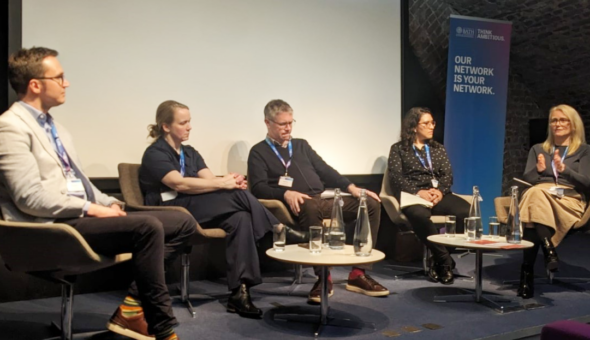This May, the Business and Society blog will focus on students. After a difficult year, when students have had to show extraordinary resilience, they've proven themselves to be diligent and dedicated to their learning. So this month we'll hear from them and shine a spotlight on their work, their experiences and their ambitions.
Hannah Moran and Nicolas Constantinou take a look at the gambling industry and argue that insincere, or a lack of focus on, Corporate Social Responsibility is to blame for ongoing consumer addiction, offering suggestions for how the industry can better protect customers. This blog was written as part of an assignment in the module People and Organisations 2 convened by Farooq Mughal.
The global gambling industry is projected to grow from $465.76 billion (2020) to $674.7 billion (2025), at a compound annual growth rate of 10.8%. This lucrative industry generates more than £13.5 billion in annual profits for UK bookmakers, greatly benefiting those in positions of power - such as Denise Coates (CEO of Bet365), who received a £323 million salary package in 2018.
Some social critics argue that this industry “feasts on the poor and vulnerable”, profiting at the expense of community losses in a zero-sum game. It’s estimated that problem gambling costs the UK up to £1.2 billion annually, and may directly lead to 250-650 suicides. The harm caused is not only felt by gamblers, but also by the wider community. It is therefore imperative that Responsible Gambling and Corporate Social Responsibility programs are effectively implemented.
Responsible Gambling & Corporate Social Responsibility
Corporate Social Responsibility (CSR) refers to the integration of social concerns in business operations and strategies. However, financial interests – which are more dominant in some industries than others - sometimes prevents the effective implementation of CSR programs. This is especially relevant in the gambling industry.
The term ‘Responsible Gambling’ has been an integral part of CSR debates since the mid-1990s, though it can be argued that it refers to the expectations of industry operations, and not the actual integration of these concerns. This is problematic given the widely acknowledged detriment to society at large. The Co-Founder of Green Jade Games argues that “to take Responsible Gambling carefully is not CSR. It is something where you use your momentum and the power you have in your company to do something good”.
Given that Responsible Gambling should reduce the amount of money gambled, convincing profit-concerned parties to implement effective CSR campaigns becomes difficult.
In such a diverse industry which includes both online and in-person participation, it’s impractical to monitor every consumer. A study by Griffiths et al (2009) showed that, when given the choice, only 26% of people used a social responsibility tool when gambling online, and only 52% of those then said it was ‘useful’.
Research on betting establishments from The University of Macau and Hong Kong suggests most employees are not concerned with their customers’ psychological problems, indicating insufficient staff training to recognise and respond to harmful betting behaviours. Moreover, when experiencing a large loss at slot machines, 43.4% of gamblers said they were encouraged by others to continue betting.
The evidence raises concerns regarding the current state of the gambling industry and poses the question: Are betting organisations doing enough to truly encourage Responsible Gambling in their establishments?
“When the Fun Stops, Stop” – An Ineffective Campaign
“When the Fun Stops, Stop” is an industry-promoted campaign aiming to incentivise Responsible Gambling. However, recent studies have questioned its effectiveness.
So, does the fun stop when people start losing? Not necessarily.
The phenomenon of ‘chasing losses’ explains how increased exposure to gambling causes dopamine release (a chemical messenger responsible for feeling pleasure) even when losses are incurred. This is worsened by lowered expectations throughout the gambling experience, which creates a distorted perception of fun when a gambler ‘wins’, incentivising ‘problem gamblers’ and addiction.
The Senet Group promoted this campaign, and argued that it worked, as 33% of regular gamblers say it prompted them to reflect on their gambling behaviours.
The University of Warwick contests its effectiveness with their research study, which indicated some gamblers who were aware of the campaign in fact bet more often than those who had not encountered it. This could be partly explained by the attention-grabbing graphics of the word ‘Fun’, as opposed to ‘STOP’ which is not the primary visual focus.
Given proven phenomena such as ‘chasing losses’ which distorts the gamblers’ perception of ‘fun’, the slogan itself is rather misleading, as it attempts to shift blame away from how the gambling experience is structured and onto those exploited by it. This deflection is even clearer when telling addicts to simply ‘stop’, rather than suggesting appropriate resources for help.
It seems that the industry is using what it can legally claim are CSR practices as a self-defence mechanism to deny responsibility for the negative externalities it creates.
Charitable Donations from Key Industry Players
Firms such as William Hill and Bet365 are making contributions to tackle this issue of insincere CSR by offering to increase the profit levy from 0.1% to 1% over 5 years – generating an extra £100m per year for more effective CSR programs for the gambling industry. Implementing this as mandatory practice for all bookmakers could reduce harmful gambling behaviours, and their associated externalities.
However, is this enough? It could be argued that forfeiting just 1% of annual profits is insufficient, especially considering this is less than one-third of Bet365 CEO Denise Coates’ annual income. Many politicians are calling for mandatory levies in response to these “frankly insulting” sums to fund addiction treatment.
Our Proposal
It is clear that the industry could be doing more to promote safer gambling through the implementation of more rigorous CSR. We’ve outlined a few suggestions to drive real change, by discouraging dangerous consumer behaviour within this industry.
- Mandatory limit-setting upon account creation – using phrases such as “How much are you willing to lose?” over different time-periods to reiterate the inevitability of losses.
- The Gambling Commission to impose a betting affordability limit based on credit score.
- ‘Reality Check’ statistics – warning messaging systems and data showing customers their account statistics e.g. ‘Consecutive loss’ account lock-outs.
Whether the gambling industry invests in these recommendations depends on an age-old question: which is more important, social or financial benefit? We would hope the answer to be the former, but in reality, this dilemma is likely to expose a profit-hungry industry failing its consumers and society at large, through the tactical use of CSR opportunities to avoid liability.
Respond



